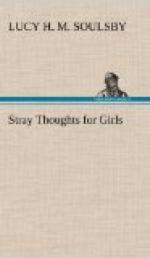“Now, Aunt Rachel, how can I do everything I ought when I leave school? I shall know nothing of Greek or Roman history, or mythology, or French or German history, or even of English, except the period we have been just doing, and I have done only a few books in the literature class, and none in foreign literature, and I have forgotten all my geography, and I shall have Latin and Greek to keep up, and French and German and chemistry, and I don’t know anything, hardly, of modern books, or of architecture or natural history, or philosophy, or of cooking”—here, in her ardour, she tripped over a stone, and her aunt availed herself of the pause to say—
“Add Shakespeare and the musical glasses, and you will have a tolerably complete programme before you.”
“Yes, Aunt Rachel, you need not laugh, you always say girls are so uneducated, and can’t respond to literary allusions; but how are they to become educated when there is so much to be done?”
“My dear Urith, there is a very wise Irish proverb, ’Never cross a bridge till you come to it,’ and though this bridge of culture seems such a bridge of sighs to you, I really do not think it need be. In the first place, it has not got to be crossed in one year. You get far more law now than in my young days, for you and your friends are not expected to come out full-blown heroines at seventeen or eighteen; you are almost expected to carry on your education for some time longer. It is not safe to count on it, for real life may come on you in a dozen ways when you once leave the safety of the schoolroom, but you will probably get several years of tolerable quiet, and, if I were you, I would not spend my first year in a desperate effort to fill up all the gaps in my education, and to go on with school-work in the school spirit. I should take my first year of freedom as the arbour on the Hill Difficulty, where Christian rested; the lord of that country does not like pilgrims to stay there for good, but they go on all the better for it afterwards. I should look on this year as being the ornamental fringe to the intellectual dress you have been weaving for yourself at school. And do not forget that the dress and the trimming are not an end in themselves—they are only to enable you to leave the house with decency, to go about your business; and at the end of the first year I should count up my possessions and see where I was wanting—if the dress proved thin, I would then set to work and furnish myself with a jacket, by hard, steady work in the second year.”
“But some of my school-work will be wasted if I don’t keep it up.”
“Quite true; but do not keep it up simply because you have once begun it; some of your lessons will have done their work by ploughing and harrowing your mind, and may be left behind. The use of school is to teach you how to use your mind, and to try your hand at several branches of study, that you may be able to follow whichever suits you.”




